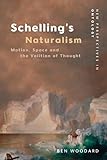Schelling's Naturalism : Motion, Space and the Volition of Thought / Ben Woodard.
Material type: TextSeries: New Perspectives in Ontology : NPOPublisher: Edinburgh : Edinburgh University Press, [2022]Copyright date: ©2019Description: 1 online resource (256 p.)Content type:
TextSeries: New Perspectives in Ontology : NPOPublisher: Edinburgh : Edinburgh University Press, [2022]Copyright date: ©2019Description: 1 online resource (256 p.)Content type: - 9781474438179
- 9781474438193
- 113
- online - DeGruyter
| Item type | Current library | Call number | URL | Status | Notes | Barcode | |
|---|---|---|---|---|---|---|---|
 eBook
eBook
|
Biblioteca "Angelicum" Pont. Univ. S.Tommaso d'Aquino Nuvola online | online - DeGruyter (Browse shelf(Opens below)) | Online access | Not for loan (Accesso limitato) | Accesso per gli utenti autorizzati / Access for authorized users | (dgr)9781474438193 |
Browsing Biblioteca "Angelicum" Pont. Univ. S.Tommaso d'Aquino shelves, Shelving location: Nuvola online Close shelf browser (Hides shelf browser)

|

|

|

|

|

|

|
||
| online - DeGruyter Nordic Film Cultures and Cinemas of Elsewhere / | online - DeGruyter Gertrude Stein's Transmasculinity / | online - DeGruyter Distributed Cognition in Medieval and Renaissance Culture / | online - DeGruyter Schelling's Naturalism : Motion, Space and the Volition of Thought / | online - DeGruyter Sensing Willa Cather : The Writer and the Body in Transition / | online - DeGruyter Speculative Grammatology : Deconstruction and the New Materialism / | online - DeGruyter Lord Seaforth : Highland Landowner, Caribbean Governor / |
Frontmatter -- Contents -- Acknowledgements -- Introduction -- 1 The Natural Forge of the Transcendental: The Movement of Th ought and the Space of Nature -- 2 Castles of Ether and Asymptotic Bridges: Kant, Maimon, Schelling and the Relation of Inner and Outer Sense -- 3 The Force of the Continuous: Schelling’s Naturalisation of Mathematics -- 4 The Red Threads of the World: Potenzen, Construction and Inexistence -- 5 Lamps, Rainbows, Unicorns and Horizons: Spatialising Knowledge in Naturphilosophical Epistemology -- 6 Speculative Pragmatism: Navigating the Richtungen of Nature and Th ought -- Bibliography -- Index
restricted access online access with authorization star
http://purl.org/coar/access_right/c_16ec
Brings Schelling's theory of nature into dialogue with Analytic and Continental philosophyUsing Schelling’s philosophy, Ben Woodard examines how an expanded form of naturalism changes how we conceive of the division between thought and world, mathematics and motion, sense and dynamics, experiment and materiality, as well as speculation and pragmatism.Schelling is a philosopher fundamentally concerned with the problem of nature and how philosophy has, historically, ignored or reduced nature’s importance. For Schelling, philosophy is impossible without a robust conception of nature, something which is lacking from most contemporary forms of philosophy both Analytic and Continental. Nature, in Schelling’s eyes, is not simply the great outdoors, or some authentic pastoral realm, but the various powers, processes and tendencies which run through biology, chemistry, physics and the very possibility of thought itself.Key FeaturesContributes to the recent rehabilitation of Schelling as a forgotten but important philosophical figureLinks the tradition of German Idealism to contemporary forms of philosophy, both analytic and continentalExamines the concept of nature, which is proving increasingly important for understanding the limitations of thought and human action"
Mode of access: Internet via World Wide Web.
In English.
Description based on online resource; title from PDF title page (publisher's Web site, viewed 29. Jun 2022)


